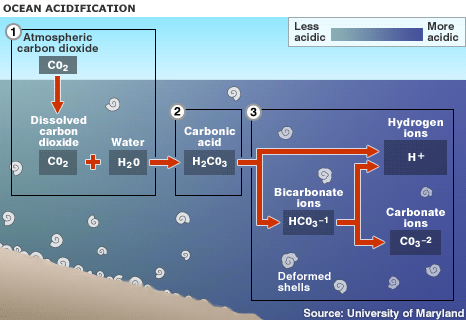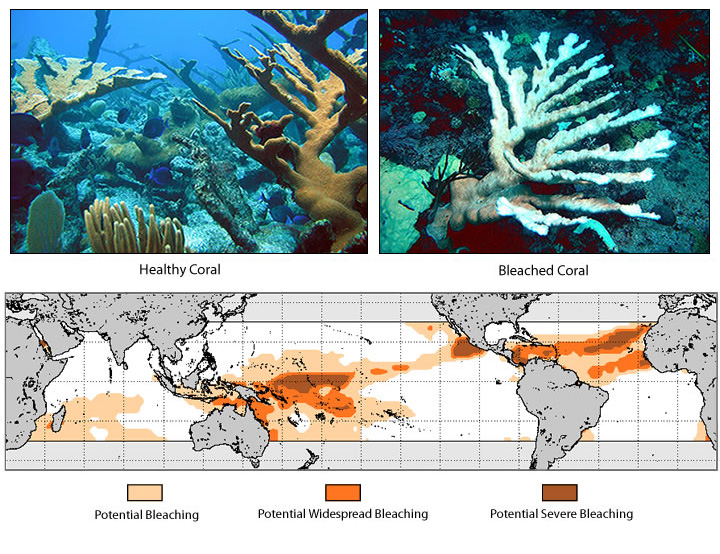Ocean acidification is a change in ocean pH (acid-alkali proportion) caused by increased emissions of CO2 (carbon dioxide) in our modern world. Marine ecologist Joan Kleypas of the National Center for Atmospheric Research will received a prestigious Heinz Award in 2011 for her work on this subject. She published a groundbreaking paper on ocean acidification in the journal Science in 1999, alerting both policymakers and scientists to the issue. Kleypas now works mainly to combat – and help prevent – the effects of ocean acidification on coral reefs. She told EarthSky:

People wrote me after this paper was published and said you’re wrong, I know you’re wrong – and I’m going to prove you’re wrong. And I actually took comfort in that. But the rebuttals never came. As people looked closely at the pieces of evidence and they looked at the chemistry, they slowly came on board to realize that this is a serious issue.
Dr. Kleypas told us that excess CO2 from the atmosphere makes the oceans more acid – and reduces the amount of carbonate available for some ocean creatures to form their shells. She said:
When we think about a lot of marine organisms – things like corals, clams, oysters, things like hard shells, those shells are made of calcium carbonate. If you reduce the amount of carbonate in the ocean, you reduce the ability of the organisms to secrete their shells.
We often refer to it as being similar to osteoporosis. There are just fewer of the building blocks to build those shells.

Kleypas’ focus is on coral reef preservation. She said many corals can’t build up as fast as Earth’s increasingly acidic oceans are breaking them down. Her work involves such things as whether marine algae can remove carbon dioxide from local waters at reef sites. She’s also using computer modeling to figure out which reefs are most likely to benefit from the setup of marine protection zones – because a healthy, undisturbed balance of organisms makes the corals more likely to survive global changes. She told EarthSky:
Most of the work I do is sort of modeling changes at the local scale and at the global scale. One of the big issues with coral reefs in climate change is … how much carbon dioxide is too much carbon dioxide for reef building? A reef is there because it produces more carbon than is removed. It’s amazing, if you ever visit a reef, you’ll see many things are chewing on the reef and breaking it down. Corals have to work hard to build that reef. You can see a balance. If they can’t produce as much calcium carbonate, then at some point these corals may be there but they’re not building a reef any longer.
In some cases, where there are marine algae growing in the reefs, those algae actually absorb carbon dioxide from the water, which can reduce the effects of ocean acidification, at least at the local level.
She said the idea of introducing corals that have been genetically modified to survive high acidity is also on the table. And she explained part of her work involves helping scientists figure out thresholds or “tipping points” for coral reef degradation.
Understanding what the thresholds are is very important because our policymakers are interested in just how high CO2 concentrations can get in the atmosphere. So our information about ecosystem function – it really gives them a guideline of creating future standards of carbon dioxide emissions.
Kleypas said she’s optimistic about her line of research
I like to call these nature’s masterpiece. If we lose coral reefs we’re really losing something that nature took millions of years to produce …











